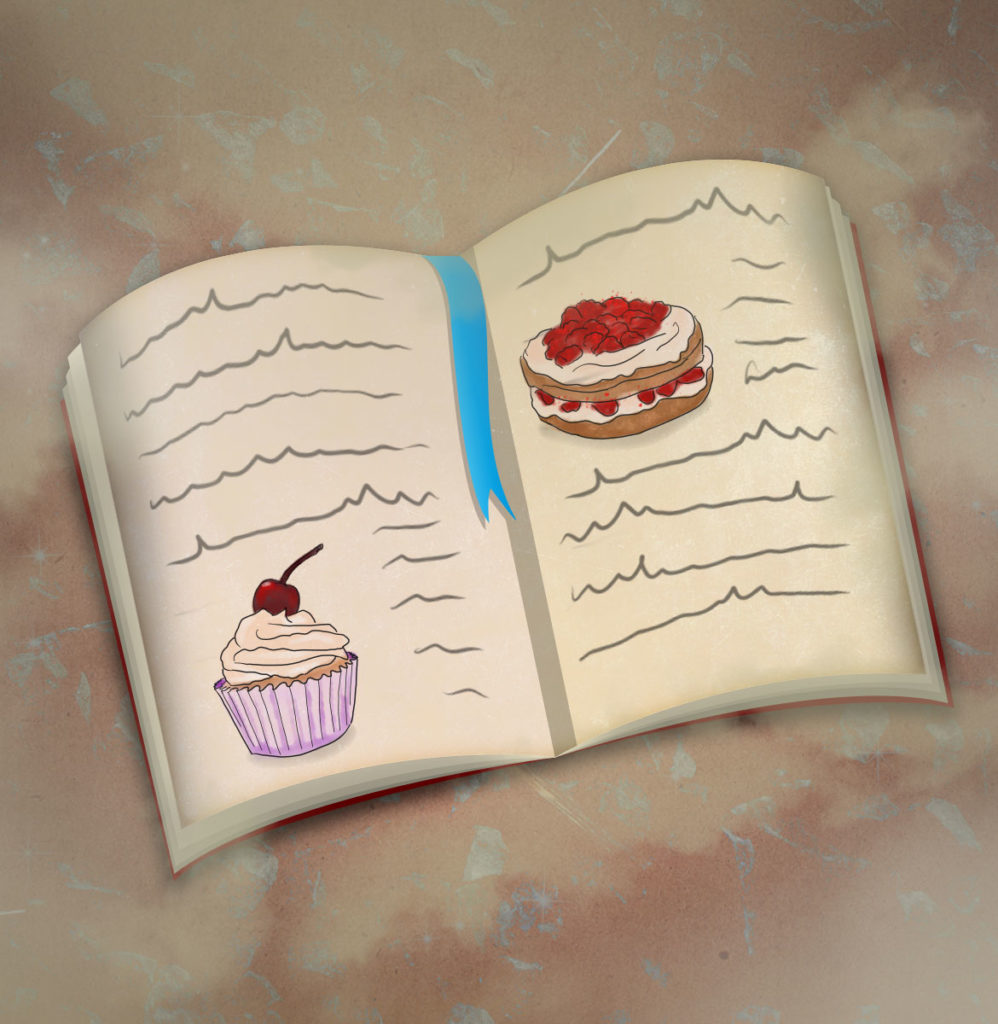
Goodbye, Julia
Lora Gray
In a desolate wasteland, a lonely figure finds comfort in an unlikely friend…
Artwork by Katie Barrett
I am fifty miles outside Gary, Indiana and sifting through the remains of a farmhouse when I find the cookbook.
It’s not the first book I’ve seen since emerging from the bomb shelter two months ago. I’ve found them peppering the lawns of demolished libraries and sprinkled over dead folks’ living rooms. I even pocketed a few for company at first, reading them aloud just to hear the sound of a human voice again, but lately, I’ve been burning them for heat. They’re easy kindling and autumn is starting to curdle into winter.
But when I pick my way through this house’s kitchen, climbing onto the counter to look for canned soup or peaches, anything to soothe the terrible ache in my belly, my knee thumps against a cabinet door and it swings wide on a broken hinge.
The cookbook tumbles out.
The cover’s so tattered that it takes me a moment to realize it’s the cookbook. The first one I ever saw or read, the one about mastering the art of French cooking that my grandmother kept in her kitchen. I’d recognize it anywhere: the photo of Julia on the cover, her hair poofed and flipped, her wholesome smile. I remember, as a child, imitating the way she stood and my mother laughing as she smooshed my hair into a bouffant. I remember, as a teenager, trying to decipher those recipes, the strange French words; my grandmother and Pappy were so proud.
Breath melting over my lower lip, I run my fingers over the ragged spine, wonder, grief and longing roiling over each other so quickly my knees buckle and I sit on the kitchen floor, cookbook cradled in my hands, Indiana October pouring through the punctured ceiling like gravy as I gingerly open it. I don’t realize I’m crying over a recipe for beef bourguignon until I taste salt creeping into my blistered mouth.
And then:
“You know you’ll need a good red wine for that recipe.”
I snap the cookbook closed, pulse heaving into my throat, my free hand dropping to my hatchet as I jump to my feet.
There she is, Julia, black and white and two dimensional, standing beside me as if she’s wandered off the back of the dustjacket and into this stranger’s kitchen. Her colorless eyes crinkle mischievously.
“There’s no wine here,” she says. “What a pity. You could make gravlax instead. Salmon cured with salt and dill? Delightful! It’s even more scrumptious than cooked fish.” Julia quivers as if she’s been shaken from a Jell-O mold, wobbling dangerously toward the book once more before firming her jaw and shimmying into solidity again.
“I don’t have any fish,” I finally manage. I can’t tell if the sharp bulb in my throat is panic or fear, hunger or hope.
“No fish? Nonsense! There’s an icebox right there.”
“But I–”
“Come now. We’ll need dill weed and salt, of course, to toughen it, and sugar to soften the skin.” Julia turns, her body paper thin as she rotates, and totters across the kitchen like a paper doll.
I know she can’t be real; I haven’t seen a living soul in weeks. Besides, real people don’t peel themselves out of cookbooks. Real people aren’t, literally, flatter than pancakes. Still, it’s been so long since I’ve talked to anyone. It’s been so very long since I’ve been anything but alone.
So I follow Julia to the refrigerator and stand beside her.
She doesn’t smell like the cookbook, like scorched paper or ink or the bitter tang of fallout. She smells like pastry dough and fresh onions. Clarified butter and lavender. Chicken stock simmering on cold afternoons.
She smells like my grandmother.
Julia gestures expectantly toward the refrigerator, the door long since blown into the dining room, and I peer inside. It’s all but empty, just a handful of moldy, barely identifiable lumps of what might have once been food.
“A center cut is best,” Julia says, leaning in beside me, “but any piece of salmon will do.”
“There’s nothing edible in there,” I say.
“Look again.”
I shake my head, feeling ridiculous, but, sure enough, there is a cut of salmon, neatly wrapped in wax paper as if waiting for me to uncover it, on the top shelf. I lift it carefully from the refrigerator and unwrap it, finding it pink, cool and fresh as west coast rivers and mountain streams. On the other shelves, are sprigs of dill, a perfectly measured bowl of sugar and a shaker of salt.
“Now,” Julia says, planting her papery hands on her hips. “Let’s begin!”
The part of me that obsessed over that cookbook as a sixteen year old wonders why we’re making a Norwegian recipe and not a meuniere or a soufflé, but Julia is guiding me through it all like an old friend and I can’t bring myself to ask. I feel the cadence of her voice in my bones, like an internal dialogue I’d forgotten I had, a memory pulled from so low in my belly, it hurts. It hurts a lot, actually, pain gnawing up and into my chest, and I curl my hands over my abdomen with a wince.
“There, there, dear,” Julia says, folding her hands over mine as if she could ease it all away. I look down and see, with a jolt, that they are my grandmother’s hands, the ones that helped me knead pastry dough. My mother’s hands chopping celery and baby carrots. My Pappy’s hands on a snowy Midwestern Saturday teaching me how to make Cincinnati chili.
I take a deep breath. The pain dissolves and together, we pry the bones from the salmon, we rub in the sugar, the salt, the dill, massaging skin side, flesh side, making sure nothing is forgotten and I feel, for the first time in forever, something like peace soften the disjointed terror of loneliness.
When I finally step back from the counter, Julia is beaming.
“The only way one learns how to cook things,” she says, gesturing broadly, “is to cook them. And you certainly cooked that!”
I laugh, feeling airy and light even as I begin to cough. “I didn’t really ‘cook’ it, though.” The pain in my belly shoves itself against my lungs. “The salt cures the salmon, remember? You said so yourself.”
Julia’s expression grows thoughtful and distant, her eyes focused on the cookbook resting on the counter as if suddenly recalling the space she once occupied. “No, dear, I suppose you didn’t really cook anything, did you? But you should know as well as anyone, one must make do with what one has.”
I follow Julia’s gaze to the cookbook, uneasiness wafting over me like steam from an uncovered pot. And there she is, on the back cover again, her face stamped onto the dustjacket as if she’d never left, inanimate, her expression frozen, gaze fixed on a sometime I can’t return to.
She is no longer beside me.
“No.”
I lift the book, turn it over and over, straining to see movement in the dimming light.
“No.”
I shake it, smack it as if trying to dislodge a stubborn lid from a jar of preserves. Julia doesn’t move. I beat the book against the countertop. Nothing happens. I tug at the pages. Nothing. I scream. I cry. I throw the cookbook onto the floor in a flurry of half-torn paper and broken binding before finally collapsing beside it, burying my face in its pages to recover her familiar scent, but I find only scorched paper and ink.
When I finally gather the courage to look at my salmon, I see only the remains of a molded fish carcass on the countertop, chewed to bone by cockroaches and fortunate mice. The dill is a jumble of dead weeds. The sugar and salt nothing but piles of plaster.
Outside, the wind is howling. It slices through the kitchen, biting my exposed skin with frigid, unrelenting teeth. The sun has begun to set.
I know what I have to do.
Clutching the cookbook, I try to ignore the ache pinching my belly to my ribs. I build a fire pit from toppled bricks and the flank of a metal radiator. As darkness falls, I sit beside the pit and imagine Julia’s hand, soft and encouraging, atop mine as we tear page after page from her cookbook and lay them in the center as kindling. It’s my grandmother’s hand, my mother’s, my Pappy’s, that pulls the precious match from my pocket and strikes it against a jagged brick. Beside me, they cheer, praising my technique as I drop it. I can feel their arms around me, familiar, loving and warm, as the first page of that cookbook ignites.
Smiling, I close my eyes and imagine the smell of burning paper into crepes suzettes. Baked Alaska.
A perfectly executed cherries jubilee.
Lora Gray is a non-binary speculative fiction writer and poet from Northeast Ohio, and has been published in Uncanny Magazine, PseudoPod, Flash Fiction Online and Asimov’s among other places. Lora is also a member of SFWA and a graduate of Clarion West. When they aren’t writing, Lora works as an artist, dance instructor and wrangler of a very smart cat named Cecil. You can find Lora online at lora-gray.com and on Twitter @LoraJGray.
Get an update when we post a new short story when you follow us on Facebook, Instagram, and Twitter.
